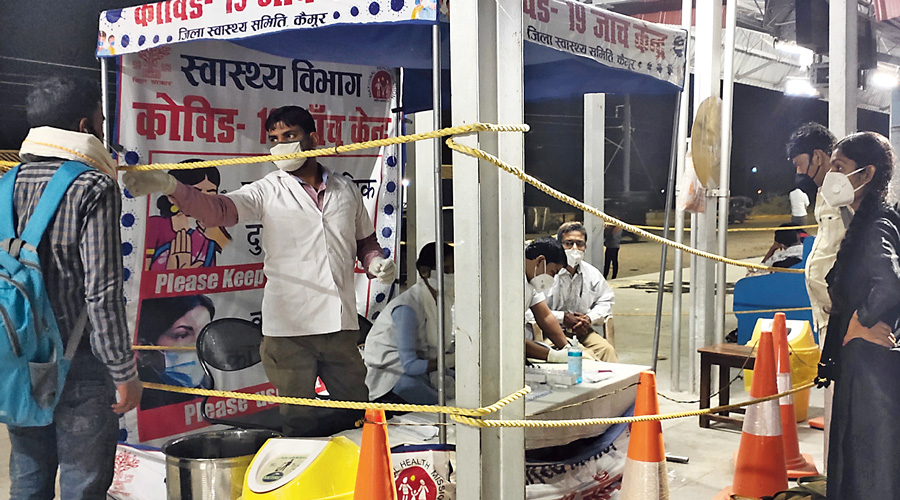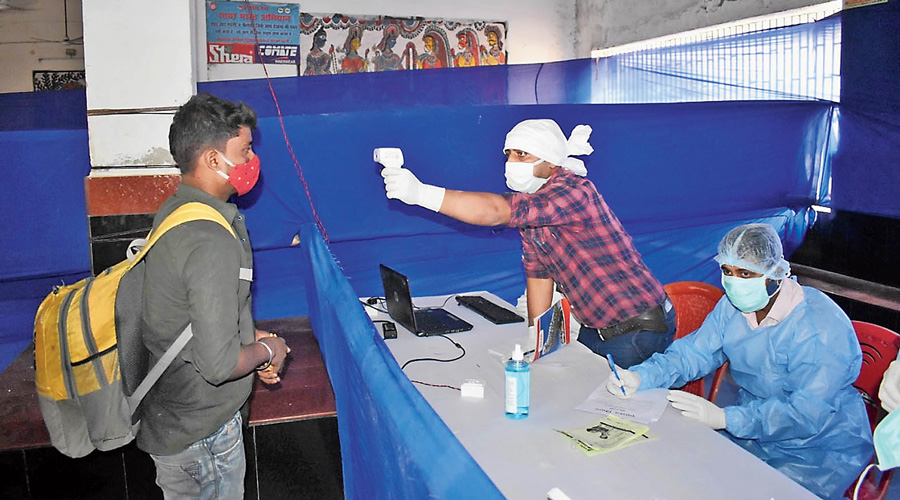As trainloads of migrant workers alight at various railway stations across Bihar, they have a common refrain. They claim that they have not fled the more developed states out of fear of the coronavirus pandemic, but have been forced to leave because of the circumstances, and by the very people for whom they worked.
Their faces do not betray any panic, nor their body language shows any fear. They are just stoic masses of human beings believing in fatalism, and accepting that nobody will come with solutions to alleviate their suffering.
Naresh Kumar, 30, alighted at Danapur from a special train from Pune, Maharashtra, in the middle of the night and spent the next few hours waiting for dawn to complete the remaining 150km journey to Sitamarhi.
He was working in a garment factory in Pune, earning around Rs 15,000 a month.
“I was determined not to leave Pune even if the world came to an end. I had come back last year during the lockdown, and had repented the trouble faced during the journey and months of joblessness. However, the factory was shut down again. I could not find any other work and was forced to return,” Naresh said.
Asked what he will do now, Naresh said he would look for work or will become a hawker selling different wares.

Migrant workers at Mohania railway station. Sanjay Choudhary
The majority of the people returning on the trains from metropolises and industrial cities are those who had returned during the lockdown last year. Not finding suitable employment in Bihar, they had returned to work in October–November last year after being called backed by their employers.
“Our employers had sent us money and tickets last year and requested us to return to work. We did so. But our salary was cut substantially within a couple of months on the excuse that they were suffering losses. When coronavirus cases increased and the weekend lockdown was announced, we were simply told we should come back later as there was no work,” said Muhammad Faiyyaz, who worked as a chef at a restaurant in Mumbai.

An official checks temperature with a thermal scanner at Sitamarhi railway station on Monday. Sanjay Choudhary
Faiyyaz is now determined to try his hand at agriculture at Kamtaul village in Darbhanga district. “It’s very hard work and I have no experience of it, but I will give it a shot. I do not want to experience the trauma of losing my job repeatedly. Besides, no government takes care of workers like us. We are forced to live hand to mouth if we lose our jobs,” he added.
Several workers who returned from cities like Mumbai, Pune, Delhi and Surat alleged that they had to buy train tickets at higher prices from touts, who had purchased them in advance.
Many people who returned to Bihar from other states a week or two before have decided to play safe and stay put at their native places instead of going back to work.
Vijay Prasad Chaurasia, 68, a resident of Kudra village in Kaimur district, arrived at Mohania Road station on April 5 to participate in the Ram Navami festival. He and his family members sell merchandise on footpath in Vile Parle (West) in Mumbai, but have decided not to return in the light of the raging pandemic and talk of complete lockdown in Maharashtra.
“The previous lockdown made us bankrupt and turned us into beggars. We earned around Rs 400 to Rs 500 daily and managed somehow to pay room rent, electricity bill and survive there. But the income becomes nil if there is a lockdown. We are not returning to Mumbai for the time being. There is nobody who cares about us. Here in our village at least we won’t die of hunger,” Chaurasia told The Telegraph over the phone from Kudra.
D.M. Diwakar, social activist and former director of A.N. Sinha Institute of Social Studies, says that the emerging scenario with regard to migrant workers from Bihar is an outcome of various factors.
“The Bihar government made much noise about skill mapping of the lakhs of migrant workers who returned from different states during the lockdown last year. It was done in a haphazard manner and without any end result. Had it been done properly, the workers would have become the agents of change in Bihar and contributed to industrialisation of the state. The politicians and the bureaucrats also did not take much interest in it,” Diwakar told this newspaper.
He pointed out that the lack of employment in Bihar forced the migrant workers to return, and this time they lost their bargaining power in the process.
“These migrant workers are now at the mercy of their employers, who are unwilling to take even a little bit of responsibility. The state and central governments over the past several decades have also not done anything to safeguard these workers or provide them any viable social security cover. The effects of labour laws have also been eroded in the country since 1991,” Diwakar said.
He added that the situation could be changed only with drastic policy changes at the state and central level.











